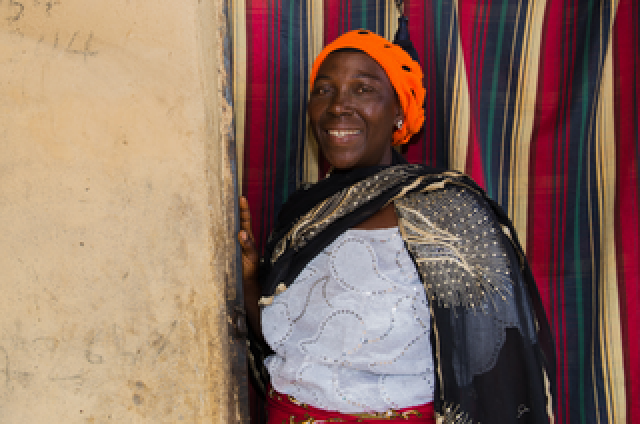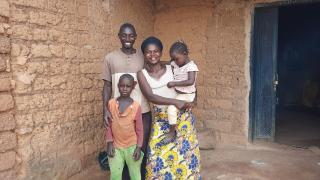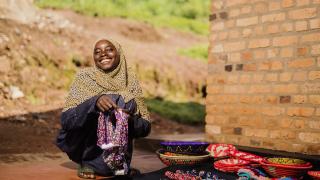Suraiya's story
My name is Suraiya
Suraiya was married at 18. Now, she is a business woman and mother of two.
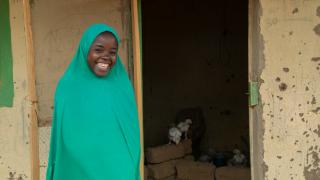
My name is Suraiya from Mararaba Liman Katagum community in Bauchi State, northern Nigeria.
I knew about Women for Women International during its initial intervention in my community. I assumed it would be like other programmes that come to collect our names, but do not come back at the end of the day. But when I saw how the first set of graduates was successful, I went for enrolment. I was not fortunate at first, but the third time I got lucky.
My lifestyle has greatly changed compared to my previous life.
It is evident in my relationship with my husband, especially because of my improved hygiene and cooking skills. He has complimented my cooking, often asking where I got these skills. I tell him that at the Women for Women International classes, the facilitators asked us what meals we prepared for the family and how was it prepared. Our trainer teaches us how to improve this and add variety for nutrition, that is why with the support from my husband I now buy vegetables, proteins like soya beans to make tofu, which we eat with soup or eggs.
Before the programme, I used to care less about my daughter’s education. When I entered Women for Women International, I learnt that a mother has a big role to play in raising her children. My daughter now attends school regularly, and has improved her knowledge. I always ask her when she comes back from school what she has learnt and she tells me. Since I cannot speak English, I do my best to assist her with the little knowledge I know in Hausa and pray for her understanding. I ensure that her uniforms are clean and neatly pressed and prepare her well in the morning for school and instruct her not to respond to anyone’s calls, especially men that call her on her way to school.
I tell my daughter: “Should any man invite you to come or touch you in any way you will have to let me know. Even if this happens in school, you will have to tell me so I can take action.”
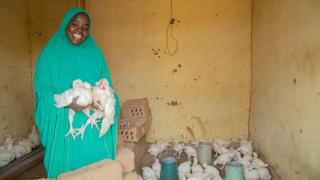
my poultry business
Before, I did not know anything about arithmetic. Since we’ve been taught through the programme, I now have good mathematical skills. This is what has boosted my interest in poultry. That is what I want to hold onto until the end of my life.
I started my poultry business by buying five chicks and feeding them. When they grow, I relocate them to a separate room. I use money to buy feed for the chicks and when they grow, my brother comes to pick them and sells them, bringing me more chicks to rear in exchange.
I’ve learnt to take care of the chicks – I know when to feed, water them and give medication. Even though medicines are written in English, I keep the empty packs and use them to reorder medication.
Before, when the colour of the chicken stool changed, I did not know what to give them, so I just gave them some drugs. Now, with the knowledge from Women for Women International, I know the specific medications to administer, especially when I observe rashes. I put the drugs in water to feed them.
I have invested a high percentage of my programme stipend into my poultry business and I have not used my stipend for any other thing.
The most important thing I learnt is the mathematical skills.
In life, if you do not have this for business, you are missing a lot. Every time I use my calculator, my friends ask me to help them calculate. I am excited because previously, nobody would consult me for this kind of activity.
my family
I am from elsewhere here in Bauchi State. I only finished Primary 4 (Year 4) when I was eight years old and then I dropped out. My husband is from Plateau State but everybody fled my husband’s village. We were brought here to this community from another community as internally displaced people.
I have had three birth experiences but only two children survived. The oldest child is a girl and she’s seven years old, in school. The younger boy will be enrolled in school when he comes of age.
My husband is a businessman, and he deals grain – he travels to Jos for business. Because my husband often travels for business to different parts of Jos, he could not represent me in the Men's Engagement Programme. He doesn’t want a situation where his absenteeism will affect my own training. My brother represents me at the Men’s Engagement Programme and gives feedback to my husband. My husband tells me how impressed he is about the training and expresses how excited he is with the Men’s Engagement Programme. That is evident in our family planning because he never bought into the idea of spacing children, but now we are on the same page.
I bless him every day when he goes out to business and advise him not to do anything immoral to make money. Whatever comes to you is blessed and that should suffice to feed the family. When he gets to his location, I call to make sure he’s arrived safely. He also calls me when he’s on his way back and asks what he can buy for his family on his return.
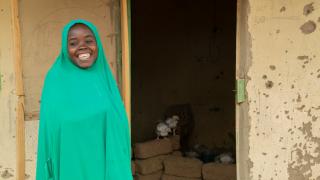
When I found myself in the programme, I was happy. Now I want members of my family to also benefit from this programme.
supporting other women
The relationship between the women in my class is even closer now than when we started.
I didn’t know some of the women in my group before now, but our training has brought us together and has enabled me to know them very well. We are compassionate towards each other. Should anything happen to any of us, we will cooperate as a group to support the woman, putting together money to donate for her. In case of bereavement and labour, we ask what she needs – if it’s money, we’ll donate; if she’s sick, we help with medical bills.
Women for Women International has truly created that bond among us.
I know many people now and we exchange pleasantries on the streets. Before, we would just see each other and pass by because we didn’t know them. Now we know each other and our houses. Even if we don’t see someone for one or two meetings, we know where to look and ask about their welfare.
For my friends outside the programme, I share my new knowledge about hygiene. I tell them to be very clean and cautious about their environment. A woman should bathe her children, ensure they are wearing clean clothes and in the evening, children should be bathed again so they will be healthy and you will be proud that your children are clean and well.
Thank you
I don’t know how to start appreciating everyone who supports this programme for what they have done.
May God continue to bless them because I have really benefited from the programme. Supporters have helped a lot of people in this community.
I am so excited that when Women for Women International gives me my monthly stipend I don’t spend a dime of it carelessly. There is nothing I can say more than "thank you, thank you, thank you" and may God bless any person involved in this programme.
Josephine
subtitle:
At 31 years old, Josephine is married with two children. She is from Nigeria, where she had to drop out of school after falling pregnant. Now, she hopes to continue her education to university level. Read her story.
Euphrasie
subtitle:
Through genocide, rape and the loss of two children, Euphrasie never lost hope. Read her story, from forced marriage to skilled beadworker and her family's breadwinner.
Yusra
subtitle:
I was very disappointed and stressed when the new government (in Afghanistan) took over because it was so hard for me to enrol in this programme, and suddenly I couldn't learn anything, but when I heard about the resuming of the programme, I was very happy.

